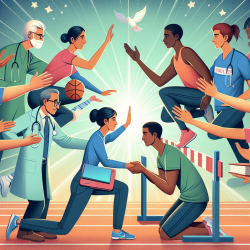As professionals dedicated to the well-being of athletes, it is crucial to continually improve our skills and understanding, particularly when it comes to sensitive and complex issues like child sexual abuse (CSA) in sport. The recent study titled Putting the Puzzle Back Together—A Narrative Case Study of an Athlete Who Survived Child Sexual Abuse in Sport provides valuable insights that can enhance our approach to supporting survivors.
Key Findings and Their Implications
The study identifies three key pathways in the survivor's journey: understanding, disclosure, and healing. Each pathway is distinct yet interconnected, illustrating the dynamic and iterative nature of recovery from CSA.
Pathway to Understanding
This pathway involves making sense of the abuse. The study highlights the ambiguity survivors often feel, especially when the abuser is a trusted figure like a coach. Practitioners can help athletes by:
- Providing education on the boundaries of coach-athlete relationships.
- Offering resources to help athletes recognize and label their experiences as abuse.
- Creating a safe space for athletes to explore their feelings and experiences.
Pathway to Disclosure
Disclosure is a critical step in the healing process but is often fraught with barriers. The study identifies several obstacles, including fear of not being believed and concerns about the impact on their sports career. Practitioners can support disclosure by:
- Building a trusting relationship with the athlete.
- Encouraging open communication and validating the athlete's experiences.
- Offering guidance on how to disclose their experiences safely.
Pathway to Healing
Healing is a multifaceted process that involves overcoming the trauma of CSA. The study suggests that active steps, such as therapy and confronting the abuser, can significantly aid in healing. Practitioners can facilitate healing by:
- Encouraging the use of adaptive coping strategies.
- Supporting the athlete in shifting blame from themselves to the abuser.
- Providing ongoing psychological support tailored to the athlete's needs.
Practical Applications for Practitioners
Education and Boundaries
One of the study's key recommendations is the need for better education on the boundaries of coach-athlete relationships. Practitioners should:
- Develop and deliver educational programs that clearly define acceptable behaviors.
- Ensure that athletes and their support networks are aware of the signs of grooming and abuse.
Role of Sport Psychologists and Other Stakeholders
Sport psychologists play a vital role in promoting the well-being of athletes. They should:
- Initiate conversations about potential problematic relationships with coaches.
- Equip athletes with strategies to deal with uncomfortable situations.
- Collaborate with other stakeholders to create a supportive environment.
The Role of Research
Research can be a powerful tool for healing. Practitioners should encourage athletes to participate in qualitative research, which provides a safe space for them to share their experiences and contribute to the broader understanding of CSA in sport.
Trauma-Informed Justice Systems
The study emphasizes the importance of a trauma-informed approach in the justice system. Practitioners can advocate for:
- Specialized courts for sexual and domestic violence.
- Training for judges and legal professionals on the realities of trauma.
- Alternative justice pathways, such as restorative justice, that focus on repairing harm and placing the victim at the center of the process.
By implementing these insights and encouraging further research, practitioners can significantly improve their skills and the support they provide to CSA survivors in sport.
To read the original research paper, please follow this link: Putting the Puzzle Back Together—A Narrative Case Study of an Athlete Who Survived Child Sexual Abuse in Sport.










